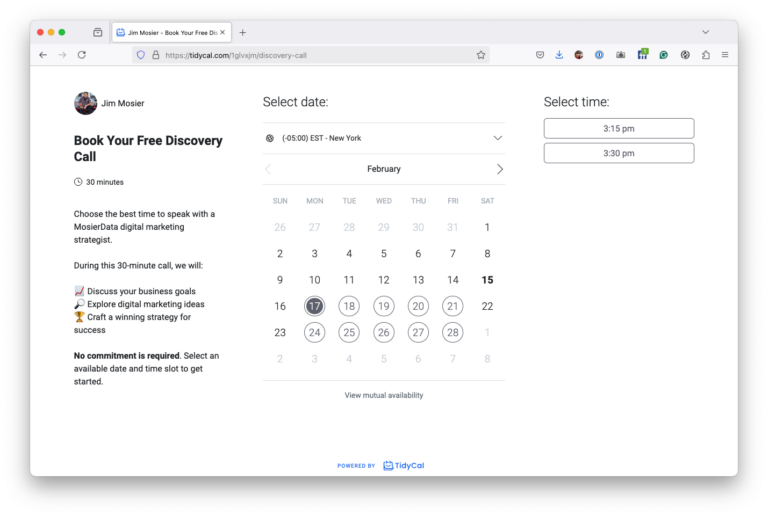If you’re looking to give your small business a competitive edge, embracing SEO with the right tools is essential. WordPress offers a range of powerful plugins that can transform your site’s visibility and attract the right audience. But that’s just the beginning. From pinpointing high-impact keywords to enhancing site speed, there’s a suite of solutions waiting to be explored. Curious about how these tools can elevate your business?
While it might seem intimidating at first, understanding the importance of SEO for small businesses is essential for your success in today’s digital world. SEO helps your business become more visible online, driving traffic to your website and increasing potential customer interactions.
When customers search for products or services you offer, you want your business to appear at the top of their search results. This visibility not only boosts brand recognition but also builds trust with your audience. By optimizing your website, you’re ensuring it’s user-friendly and engaging, making visitors more likely to stay and explore.
Investing in SEO is a cost-effective strategy that can level the playing field against larger competitors, ultimately leading to increased sales and growth.
To enhance your WordPress site’s visibility, leveraging the right SEO plugins is pivotal. These tools streamline your efforts, ensuring your site ranks higher on search engines.
Start with Yoast SEO, an extensive plugin offering on-page analysis, keyword optimization, and readability checks. Another great option is All in One SEO Pack, which provides features like XML sitemap support and Google Analytics integration.
If you’re looking for a lightweight alternative, consider Rank Math. It offers similar functionalities with an intuitive interface and detailed SEO analysis. For added security and speed, opt for SEO Squirrly, which focuses on keyword analysis and content optimization.
These WordPress plugins simplify SEO tasks, helping you boost your site’s performance and connect better with your audience.
Identifying the right keywords is crucial for reaching your target audience and improving your site’s search engine ranking. You can’t just guess what potential customers might search for; you need effective keyword research tools.
Start with Google Keyword Planner. It’s free and offers insights into search volumes and trends. Try SEMrush for comprehensive analysis and competitor research. Ahrefs is another favorite, providing keyword difficulty scores and advanced metrics. Don’t forget Ubersuggest, which offers keyword suggestions and content ideas.
These tools help you discover high-traffic keywords relevant to your business. Focus on long-tail keywords for niche targeting—they’re less competitive and often convert better. With these resources, you’ll pinpoint the keywords that drive traffic and boost your online presence.
Mastering on-page SEO in WordPress is indispensable for elevating your site’s visibility and attracting the right audience. To optimize effectively, first, guarantee your content is rich in relevant keywords without overstuffing. Use WordPress plugins like Yoast SEO to simplify the process, guiding you on keyword placement, readability, and meta descriptions.
Next, focus on crafting compelling title tags and headings. These elements help search engines understand your content’s structure and relevance. Don’t forget to optimize your URLs—keep them short and descriptive.
Images also play a pivotal role. Compress and use alt text to guarantee they contribute to SEO rather than hinder site speed. Finally, link internally to boost navigation and keep visitors engaged longer, enhancing both user experience and search rankings.
Building on the foundation of on-page SEO optimization in WordPress, let’s shift focus to enhancing your site’s speed and performance. A fast-loading website is vital for retaining visitors and boosting your search engine rankings.
Start by optimizing your images; use tools like TinyPNG to compress them without losing quality. Leverage browser caching to store static files, reducing load times for returning visitors. Consider a Content Delivery Network (CDN) like Cloudflare, which distributes your site’s content globally, ensuring quicker access for users everywhere.
Minimize HTTP requests by combining CSS and JavaScript files. Regularly update plugins and themes to keep your site running smoothly. Finally, choose a reliable hosting provider that offers solid speed and uptime. Remember, every second counts in the digital world.
To truly maximize your SEO efforts, you should harness the power of analytics to guide your strategies. By leveraging tools like Google Analytics, you get valuable insights into how users interact with your website. This data helps identify which keywords drive traffic and pinpoint pages needing improvement. You can track bounce rates to understand where visitors drop off and adjust content accordingly.
Set up goal tracking to measure conversions and see which tactics are most effective. Regularly review your traffic sources to determine which channels bring the most value. Analyze user behavior to refine your site’s structure and enhance user experience. By consistently monitoring and interpreting this data, you’ll make informed decisions, ultimately boosting your site’s visibility and ranking.
While analytics illuminate the path to better SEO, focusing on local strategies can markedly enhance your reach within your community. To start, claim your Google My Business listing. It’s a free and effective way to guarantee your business appears in local search results and Google Maps. Optimize your listing by adding accurate details, high-quality images, and customer reviews.
Don’t forget about local keywords. Incorporate them naturally into your website content, meta descriptions, and titles. Think about what your community searches for and tailor your content accordingly. Join local online directories to boost your visibility further.
Encourage happy customers to leave positive reviews. They enhance credibility and help elevate your ranking in local searches. By leveraging these strategies, you’ll connect better with locals and drive more foot traffic to your business.
As you endeavor to improve your WordPress site’s SEO, acquiring quality backlinks becomes an essential strategy. Backlinks act as endorsements from other websites, boosting your site’s credibility and search engine rankings.
To start, create valuable, shareable content that naturally attracts links. Guest blogging on reputable sites in your niche is another effective way to gain backlinks. Reach out to influencers or industry leaders to collaborate on content that includes links to your site.
Additionally, consider using tools like Ahrefs or SEMrush to identify backlink opportunities and track your progress. Remember, focus on quality over quantity. Links from high-authority sites are far more valuable than numerous links from low-quality sources. Stay persistent and strategic to see significant improvements in your SEO efforts.
In the ever-evolving world of SEO, keeping an eye on emerging trends is critical for maintaining your site’s competitive edge. You need to regularly monitor search engine algorithm updates and industry shifts to stay ahead. Use tools like Google Trends, SEMrush, or Ahrefs to track changes in keyword performance and competitor strategies. Don’t hesitate to adjust your SEO plan based on these insights.
Stay informed by subscribing to reputable SEO blogs and following industry leaders on social media. Attend webinars and conferences to gain fresh perspectives and network with other professionals. Remember, flexibility is key. What worked last year mightn’t be effective now. By staying adaptable, you’ll guarantee your small business remains visible in search engine results and continues to thrive.
Social media can critically impact your small business SEO by increasing visibility and driving traffic. When you share content on platforms like Facebook or Twitter, you create more opportunities for backlinks, which are vital for SEO.
Engaging with your audience and encouraging shares can boost your content’s reach, potentially leading to more website visits. Plus, social signals can help search engines understand your business’s relevance and authority, enhancing your overall SEO strategy.
Using a content calendar for SEO helps you stay organized and consistent with your publishing schedule. You can plan and track your content, ensuring it aligns with your keywords and SEO strategy.
It also allows you to identify content gaps and opportunities for improvement. By maintaining a regular posting schedule, you enhance your site’s authority and engagement, which can lead to better search engine rankings and increased visibility for your small business.
Mobile optimization directly impacts your site’s SEO rankings by improving user experience and loading speed.
When you optimize for mobile, you’re ensuring that users can easily navigate and interact with your content on their devices. Search engines prioritize mobile-friendly sites, so if yours isn’t optimized, you could lose visibility and rankings.
Absolutely, video content can greatly boost your small business’s SEO. Search engines love rich media, and videos can increase user engagement and time spent on your site, two vital factors for SEO rankings.
Ensure your videos are relevant, high-quality, and include appropriate keywords in titles and descriptions. Don’t forget to optimize video file sizes for faster loading. By doing so, you’ll enhance your website’s visibility and attract more potential customers.
Voice search plays a significant role in modern SEO strategies by changing how users search online. You need to optimize for natural language and conversational queries since people speak differently than they type.
Focus on long-tail keywords and guarantee your site is mobile-friendly. You should also provide quick, concise answers for voice assistants to pick up easily. By doing this, you’re more likely to capture the growing number of voice search users.
By embracing these essential SEO tools and strategies, you can markedly boost your small business’s online presence. Focus on using WordPress plugins like Yoast SEO, conduct thorough keyword research with tools such as Ahrefs, and enhance your site’s speed and performance. Don’t forget to leverage analytics for continuous improvement and adapt to evolving SEO trends. With dedication and the right approach, you’ll drive more targeted traffic, build trust with your audience, and ultimately achieve greater success.

